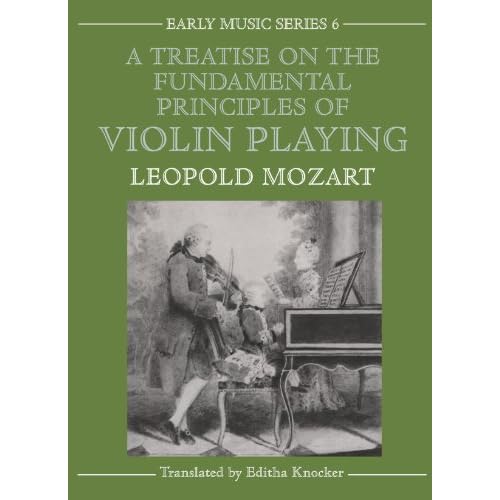First, he listed three books on performance practice that every musician should own:
 Leopold Mozart's A Treatise on the Fundamental Principles of Violin Playing
Leopold Mozart's A Treatise on the Fundamental Principles of Violin PlayingJ.J. Quantz' On Playing the Flute
C.P.E. Bach's Essay on the True Art of Playing Keyboard Instruments
I haven't read any of these completely yet - I'm thinking of making it a new year's resolution. I did begin Leopold Mozart's book last summer, having found it in a university library. I really enjoy the stuffy old-fashioned language of pedagogical treatises, and the funny stories and observations about performing life that get told in passing. Leopold Mozart definitely goes on some silly tangents - even reading his chapter on basic notational principles was hilarious. It might not look like light holiday reading, but I'm pretty sure you'll find this stuff as amusing as it is worthwhile.
Robert Levin was constantly challenging the wind players to articulate the character of the music. I sometimes feel constricted in music of the classical style - even the word classical feels constrictive! But watching Levin sing, sigh, giggle, and hum through a Mozart concerto really opened my ears to some of the possibilities of this music. His whole body just seemed set free when he demonstrated a passage - demonstrations which were as often with singing and gestures as playing on the piano. On a few occasions I have seen Michael Tilson Thomas 'perform' an orchestral score in this way, acting as though he's been possessed by all those symphonic themes and rhythms.
One of the thoughts Robert Levin left us with was this: the problem with Mozart's music is that it's too easy for children, and too hard for adults! Lately I feel like one of those adults, furiously obsessing over all the complexities and complications of making music. Sometimes I wish I could forget all this stuff, and just go back to the child-like wonder of putting together beautiful sounds. Somehow a musician like Robert Levin balances the two, or finds a way around the paradox. He has so thoroughly analyzed all this music, and studied its history down to specific manuscripts and performances, and reached his very thoughtful conclusions. But then in front of an audience, or just a bunch of fellow musicians, he makes it come alive in a way I can't possibly convey in words.


 Technorati Link Count: no. of blog reactions to this post
Technorati Link Count: no. of blog reactions to this post
1 comment:
The Study of Counterpoint by J. Fux was one of the funniest books I ever read...
Post a Comment